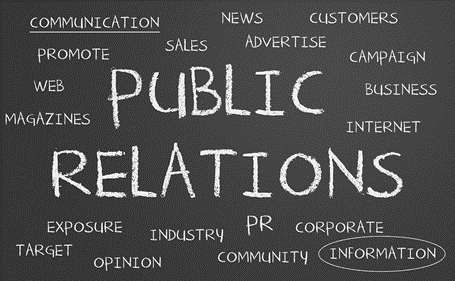When I think of blogging, I think of 7-year-old me writing a diary about everything I did every weekend throughout my childhood to look back at and remember the fond memories. Now that I have grown up and had the opportunity to look back at these supposed ‘blogs’ I drafted. It usually consisted of my weekly dance class and a sleepover at my favourite aunties house. But since this is my first ‘official’ blog lets start over. When my lecturer Conor asked us to each write a blog on a professional topic within the PR industry it got me thinking, how would I sum up in my head the definition of Public Relations?
The public relations and communications association (PRCA) defines public relations as ‘the way organisations communicate with the public, promote themselves, and build a positive reputation and public image. The way an organisation is represented in the media has a huge impact on how people perceive it. PR professionals try to influence the media to represent their organisation positively and communicate key messages. (PRCA, 2020)
Yes, there is a lot of this definition I would agree with, however, in my eyes it’s so much more. So much more I could probably write 50 pages about. In a lecture with Conor he asked us to each come up with a definition of what we thought PR was. So, for me I got my pen and paper and started writing random words in bubbles around the page. He then asked us to ask a family member to see how they would sum it up and how their definition differed from mine. My mum made me laugh as she stood there making the dinner and said, ‘I take it it’s just marketing a company!’. Three words kept appearing in the back of my head and it got me thinking, does anyone really know what PR is?

The first was the organisation. Now to me, an organisation is Tesco so I can understand when PRCA refers to ‘the way an organisation is represented in the media’ and how Tesco have TV adverts, radio adverts, social media platforms and even for me a monthly email to my inbox for some light bedtime reading! But then Conor mentioned something that stuck, and it was ‘but the Kardashians wouldn’t be considered a company or organisation, would they?’ I’m not going to lie I did zone out for a few seconds because I’m one of those people who will agree with it being the biggest load of rubbish but secretly binge watch it all day on a Sunday afternoon. But in reality, the marketing and digital side to an organisation are all merging, so to me there is no clear, concise answer to that being considered the definition of PR.
Secondly is publics. When I think of publics, I think it means segmenting our population into different groups and that the core message an organisation is trying to portray is relatable and when needed, they may tweak a message to make it suitable for the target audience. When I look at the level of interest regarding publics, it’s clear to see that this cannot always be achieved by every organisation. For example, a local bakery may not be able to gain the same message to the publics as Tesco might or that one set of publics could be more ‘aware’ and the other more ‘latent’ when it comes to an organisation. It’s about tailoring the core message to each set of publics in a way that will not conflict itself. Jerry Silfwer, 2015 says ‘Group people on the basis on what situation that created them and how, when and where they choose to communicate. It’s easier, it’s faster, it makes more sense and most of all — it makes your public relations activities much more relevant and efficient.’
And finally, reputation. In the eyes of some, this factor is not held highly accountable but, in my opinion, reputation is important although it is not necessarily controlled by the PR team itself. Many people will disregard reputation and say that it is connected with relationships. But to me, they are categorised completely differently. For me, it’s the image I envisage in my head when I think of an organisation, company or even the Kardashians! Or on the other hand, a bad scenario that sticks in my head when something is leaked or a few negative comments that one time on my 3am twitter rampage. But then again, not the full package of what a true definition of what public relations stands for.
So, organisations, publics, and reputation are definitely relevant in shaping the definition of public relations but are by no means in my eyes what make up the full picture. So, what is the full picture? Will we ever know? For now, I’d say there is no single-handed answer to what or how to define public relations because the truth is its ever-changing and that is the beauty of it. In my opinion of being a student studying the academic literature and history of what it has brought to the table over the years, I would say it’s a professional industry that helps organisations to communicate to its publics in an effective way which then helps to uphold a reputation which other organisations and departments can learn from within the workplace as well as outside the workplace and these messages are mostly perceived well by the media as they are sent and passed on.

Megan Strain is a part-time final year BSc in Communication Management and Public Relations student at Ulster University. She can be found at – Instagram and LinkedIn.